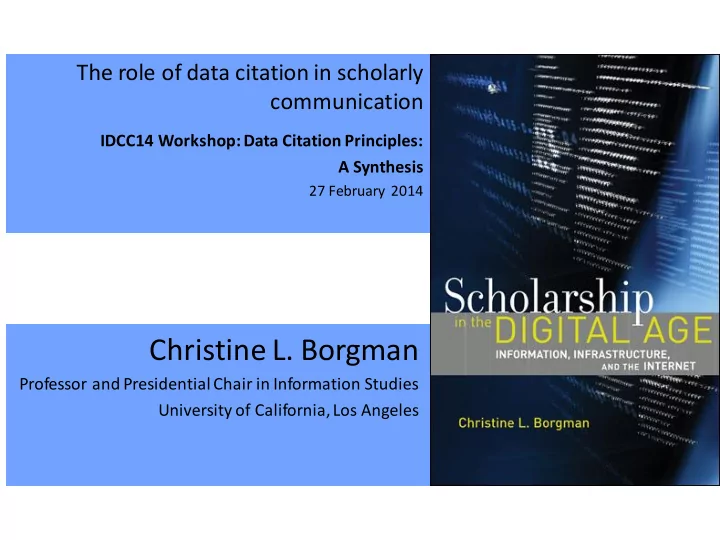

The role of data citation in scholarly communication IDCC14 Workshop: Data Citation Principles: A Synthesis 27 February 2014 Christine L. Borgman Professor and Presidential Chair in Information Studies University of California, Los Angeles
Deluge!!! Data! Scientists Social Scientists Humanists Funding agencies Librarians Policy makers Publishers Internet architects http://www.guzer.com/pictures/suprise_suprise.jpg 2
What are data? NASA Astronomy Picture of the Day Marie Curie’s notebook aip.org hudsonalpha.org ncl.ucar.edu http://www.census.gov/popul ation/cen2000/map02.gif http://onlineqda.hud.ac.uk/Intro_QDA/Examples_of_Qualitative_Data.php 3
hudsonalpha.org Data are representations of observations, objects, or other entities used as evidence of phenomena for the purposes of research or scholarship. Borgman, C.L. Big Data, Little Data, No Data: Scholarship in the Networked World , 2014, forthcoming, MIT Press 4
Publications • If publications are the stars and planets of the scientific universe, data are the ‘dark matter’ – influential but largely unobserved in our mapping process* • Publications are arguments made by authors, and data are the evidence used to support the arguments. *CODATA-ICSTI Task Group on Data Citation Standards and Practices, 2013, p. 54
Authorship and Attribution • Publications – Independent units – Interpretable by intended audience – Authorship is negotiated • Data – Compound objects – Interpretable only in relation to other objects – Ownership is rarely clear – Attribution • Long term responsibility: Investigators • Expertise for interpretation: Data collectors and analysts
Scholarly credit • Publications • Publications • Publications • Publications • Publications • Publications • Awards and honors • Grants • Teaching • Service • Data http://blog.startfreshtoday.com/Portals/170402/images/improve-credit-score1.jpg
Data citation as solution to… • Credit • Attribution • Discovery
Recommend
More recommend